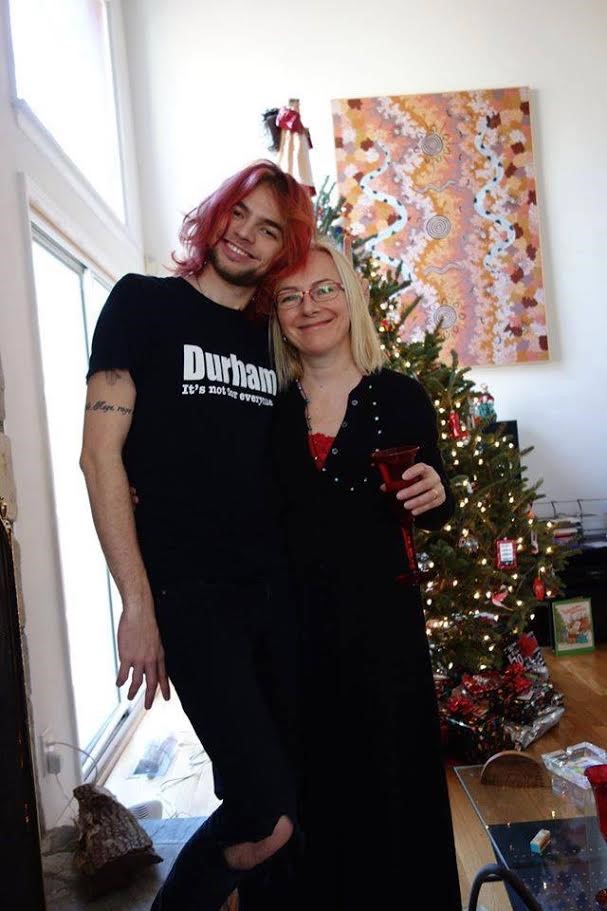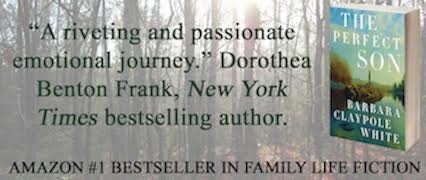
Parenting a child with an invisible disability is something that today’s featured writer is no stranger to. Barbara Claypole White’s book, The Perfect Son, has been on my list of books to read since this year’s GoodReads Choice Awards nominations came out. I knew that it would be such a treat for us all to hear about Barbara’s incredible book and also a little about her parenting journey as the parent of a child with an invisible disability.

The Perfect Son is a beautiful story of a struggling father and son relationship and the mother that holds them together. When Ella has an unexpected heart attack, the result of a heart condition, and must be hospitalized the men in the family must come together to help her and themselves. As a strained relationship between a father and son becomes further strained Felix finds himself suddenly in charge of his son who has Tourette’s and needs more assistance than most teenage boys. Forced to reconcile their differences, they find comfort in unlikely friends and in each other.
Now grab that coffee and settle in with this incredibly open, honest, and funny Barbara Claypole White today!

The fictional Ella & Felix are raising a son with Tourette syndrome which puts a lot of strain on their marriage, particularly when Ella becomes sick and is unable to help. You have shared that you are a parent of a child who has battled obsessive-compulsive disorder and even have a genetic heart issue yourself that inspired Ella’s journey. Were you able to channel a lot of your own struggles as a mother and wife into this story? How do you keep your marriage healthy when your children’s mental health comes with so many challenges?
Great questions, because the original story seed came after a mom in our local support group for parents of OCD kids asked why my marriage had survived when most of the marriages in the group had failed. I think it was a combination of factors: our marriage was well-established, we only have one child, I was a full-time parent, and we’re good at tag teaming in a crisis. Plus the three of us communicate well with each other. Of course all this lovely knowledge comes with hindsight. The early days of undiagnosed OCD were hell. My husband and I had very different parenting styles, which made the situation a thousand times worse, and our first child psychologist was not an OCD expert. When our son was around nine, we hit crisis point. I researched the heck out of OCD, found a local psychologist who specialized in exposure therapy, and told my husband that I would take on the treatment one hundred percent if he would agree to never countermand me. This is exactly what Ella did: she compartmentalized the family.
Dividing up our roles—I was the caregiver; my husband was the breadwinner—worked, and we managed to force the OCD into submission (until the stress of junior year of high school retriggered it). But I always knew that my husband was my safety net. I remember one evening when I’d run out of coping skills and he had a dinner meeting. I called him and said, “I’m losing it. I need to walk away.” And he drove straight home. Ella never had that luxury. Or rather she never trusted Felix enough to ask for help.
I also encouraged our son to be open about his struggles—as Ella did with Harry. There is no shame, and sharing information with other kids and teachers helped our son. Too many people with invisible disabilities suffer in secrecy and isolation. I was determined that would not be his path.
Ella’s journey, learning to let go, was definitely my journey. Our son was awarded a full-ride to an in-state college, which I secretly hoped he would accept. But his heart was set on Oberlin—three states away and a ten-hour drive. He’s thriving there, although the first few weeks were rough. He was homesick, and my husband and I were terrified (OCD can morph quickly). At some point, however, you need to trust that you’ve done enough good work to enable your child to monitor and take responsibility for his illness. Once our son had settled in, my husband and I discovered we quite liked being empty nesters.
I love that when you wrote about Harry’s struggles with Tourette syndrome you did not go the typical route associated with the disorder, which is involuntary swearing or the utterance of obscenities (coprolalia). I read, in fact, that only ten percent of people with Tourette syndrome actually exhibit this symptom and that Harry’s tics are more common to this syndrome. Was this a conscious decision to not include this? Did you want people to think differently about Tourette syndrome or do you think that a dialogue like that would have been a distraction to the story you had crafted?
It was a conscious decision. One of my early readers was the mother of a teen with Tourette’s, and she thanked me for not giving Harry coprolalia. That’s when I knew I was heading in the right direction.
My goal is always to create complex characters, not stereotypes that scream, “I am my disorder.” When I started doing book clubs for The Unfinished Garden—a love story about grief, OCD, and dirt—I was shocked to discover how many people interpret OCD as a fear of germs. (Thank you, television detective Adrian Monk.) Symptoms of OCD and Tourette’s are highly individualized; there are no textbook cases of either. The same is true for the bipolar disorders.
My first introduction to Tourette’s, however, was the stereotype. Remember that episode of LA LAW when the firm had a client with coprolalia? I wrongly assumed this was the standard version of Tourette syndrome, and after my son was diagnosed with OCD, I kept telling myself OCD wasn’t as bad as Tourette’s. These days I can’t decide which scenario is worse: that you can hide OCD or that you can’t hide Tourette’s.
Felix, Harry’s father, was a character that I found to be unlikable for a good portion of the book. We later learn that Felix has struggled with many demons, including abuse from his own father, which make it hard for him to love his own son. Since you are a parent of a child who needs extra help in the world, did you have a hard time writing these scenes with Felix and his irritation with Harry’s disabilities or did a part of you relate to his frustrations as a father?
I was rooting for Felix from day one, but the trick was hoping readers would stick with him long enough to see the amazing decisions he makes as the story unfolds. When the novel starts he’s an outsider in his own family and definitely an anti-hero. But then you witness him attempt—three times—to create the perfect sandwich for Harry’s lunch, and realize how hard he’s trying to cope. Even though other characters in the novel misjudged him constantly, I always understood Felix. I heard his voice from the beginning, and I knew exactly how he would react. More importantly, I knew why.
The flashback scene to Felix’s relationship with his own dad was framed within a recurring nightmare I’d had as child: I saw a black study at night, with a cold fireplace, a black wing chair, and an open window with black curtains blowing in the wind; and I sensed evil coming through the window. I took all that fear and gave it to poor little Felix. I could forgive him anything after that scene.
Do you think that Ella is a helicopter mom or do you think that her actions were necessary to insure that Harry was able to function well through his life? Do you think overprotectiveness is really necessary for kids like this and what has helped bring balance to your own life as a mother?
Ella raised an amazing young man. She gave him the confidence to be Harry and that’s his armor in a judgmental world. I hope I’ve given my son the same gift. And yes, I think parents of children who process the world differently need to be overprotective. Our goal posts keep moving, and half the time we don’t even have a rule book.
When our son developed horrible sleep patterns, I gave up trying to keep him in his bed and created a permanent nest for him on our bedroom floor. Some of our friends were horrified and expressed their opinions quite loudly. I became good at nodding and ignoring, because I was doing what worked for my family. (I’m witchy when sleep deprived. A happy Barbara was best for all!)
Once I’d learned how to be my son’s OCD coach, I gained confidence in the knowledge that I could help him. When he was accepted to a small private school in Durham, North Carolina, not unlike Harry’s school in the novel, the admissions officer told me they’d never had a pupil with OCD before. My response was to type up an information sheet for the teachers and staff called OCD 101. And I always gave the OCD update at parent-teacher conferences. Some of those teachers are still family friends. Man, I loved that school…
I was our son’s advocate throughout grade school, although I did back off in high school. And I had nothing to do with the college search. My husband and son handled that without me. (An excellent exercise in father-son bonding.) Now that our son’s an adult, I’ve had to learn that I’m no longer his coach. Only he can do the work to manage his anxiety; I just cheer him on from the sidelines.
Being open, finding acceptance, knowing that bad days end…all these have helped me find balance as a mother. And I garden, which is the best therapy. Did I mention I also drink gin every Friday with my best friend? Girlfriends rock.

Ella struggles with Harry moving away and going to college on his own, and I understand that you have also gone through the same experience letting your son go off to college as he struggled with OCD. As a parent of a child with invisible disabilities, do you have any advice for moms about letting kids go when you have spent a lifetime monitoring them so carefully? Even thinking about this creates anxiety for me!
I think the first step is always to listen to your child. I was hoping our son would stay in-state, but I never imposed that opinion on him. And thank goodness, because he would have driven home every weekend to hang out with his BFF. Instead he learned to live outside his comfort zone and tackle many of his anxieties, including a terror of flying. We also followed his lead on mental healthcare. Although we researched options on campus, he chose to keep his mental health team here. It turned out to be a wise move. He does phone consults as needed, and I make appointments whenever he’s home on break.
Keeping the communication lines open is also essential. We text every day, and the three of us Skype once a week. We also have an open policy that he can text or call us at any time of the day or night if he’s in crisis. And I told myself—from day one—that if things didn’t work out and he had to leave, I would be proud of the incredible achievement he had made by going there. So many teens with OCD can’t leave the house, and now he’s a junior in college. My crazy, off-beat son—what a guy.
You have created such an incredible supporting cast. As someone who is very particular about spelling and grammar, I REALLY loved Max and his need to always use punctuation in his text messages. Did you have a favorite supporting character that you loved writing?
Thank you. I love writing secondary characters. Max was tons of fun because he has none of Harry’s anxiety. Every time I hear Green Day’s ‘Troublemaker’ I think of Max. He’s such a generous soul and so devoted to Harry. But if I had to pick my favorite, it would be Eudora. Writing her was a hoot. She came to me fully formed wearing the hat from the final scene, but I couldn’t see how she would fit into The Perfect Son. I put her aside for a future story…until I was spitting out my first draft, and she appeared in Ella’s garden with a pair of clippers. Then I knew she had to stay.

The Perfect Son has received absolutely glowing reviews on Amazon and was selected as a GoodReads Choice Award Semifinalist for Best Fiction in 2015 and as a Kindle First selection. What is that like for you as a writer and do you feel more pressure with your next book to deliver something as equally fantastic?
No pressure, right? Twitch, twitch. The success of The Perfect Son has changed everything, and the demands on my time have skyrocketed. Right now I could work 24 hours a day seven days a week and never be on top of everything, but I’m finally making a living as a novelist and can afford to hire a cleaner. Yay.
When I’m researching and writing, I think only about my characters, not my audience. I’ve also learned that each novel has its own rhythm and I can’t compare my stories. The new manuscript has a very different feel, so I’m intrigued to see how fans react. There’s more dark humor, it’s definitely busier, and I have four strong characters who each insisted on having a voice: Marianne, my record producer heroine—a complex woman who has manic-depression; her almost-daughter Jade, a former teen runaway; Darius, Marianne’s devoted husband, a music legend with anger management issues who got kicked out of AA because he wasn’t an addict; and Gabriel, the English vicar who was Marianne’s first love. Called Echoes of Family it’s due out in late September, and it’s the reverse of The Perfect Son, which is a story about how you can’t escape genetics. This time I’ve created a family without blood ties—a social group that came together out of need and supports each other in a gloriously dysfunctional way. I’m big on dysfunction.
You have said that The Perfect Son has been your most challenging to write. Why did you find this book more challenging than the previous two you wrote?
This was the first novel I wrote entirely to contract, with the deadline clock ticking. Everything that could go wrong, went wrong: I had endless problems with the research—it took me seven months to find a cardiologist who would talk with me; I lost more titles than anyone should have to lose; and I turned the manuscript in to my first publisher only to learn my contract had been cancelled. Fortunately I have the best agent in the world, and two weeks later I had a new contract with a great publisher and a terrific team. Then I came up with the right title and there was no looking back.

Our readers might be unaware that you were part of the first British Designer Show and have worked for Vivienne Westwood. Are you still passionate about fashion now that you are a writer? Which celebrity was your favorite that you dressed?
I don’t follow trends anymore, but the fashion world has crept into my characters’ backstories. Ella, for example, was a jewelry designer. I’m still a wee bit of a clotheshorse, even though I work in leggings and sweatshirts most of the time. And I love my fuzzy slippers. But I do enjoy clothes retail therapy, and planning author outfits is way too much fun. As for celebrities…I measured an English singer in her bra and knickers once (not telling who!) and she was lovely. But my favorite story from that time was seeing Princess Diana at the first British Designer show. She was wearing pink suede by Maxfield Parrish, one of our clients, and the entire exhibition hall went silent when she walked in. Surrounded by men in black suits, she was taller than most of them and her blonde hair stood out like a beacon. It was an incredible moment; she had such presence.
Jane Eyre by Charlotte Bronte. It has everything: a spunky heroine, a messed-up sexy hero, a mystery, a dysfunctional family, plus love and madness in the English countryside. And Jane makes Rochester cry. I aim to make all my heroes cry. Yes, even the vicar in Echoes of Family.

You can connect with Barbara Claypole White on her website or through Facebook! I’m always thankful for these moments with writers and I hope you will pick up this amazing book! You can always connect with me on GoodReads, through our books section of our site, and you can read our entire Sundays With Writers series for more author profiles. Happy reading, friends!
*This post contains affiliate links!